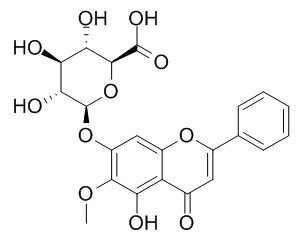Oroxylin A 7-O-beta-D-glucuronide
Oroxylin A-7-O-glucuronide and wogonoside should also be served as the chemical markers together with baicalin for the quality control of herbs and proprietary traditional Chinese medicine (PTCM) products of radix Scutellariae.. Oroxylin A 7-O-glucuronide can inhibit total prolyl oligopeptidase (POP) activity.
Inquire / Order:
manager@chemfaces.com
Technical Inquiries:
service@chemfaces.com
Tel:
+86-27-84237783
Fax:
+86-27-84254680
Address:
1 Building, No. 83, CheCheng Rd., Wuhan Economic and Technological Development Zone, Wuhan, Hubei 430056, PRC
Providing storage is as stated on the product vial and the vial is kept tightly sealed, the product can be stored for up to
24 months(2-8C).
Wherever possible, you should prepare and use solutions on the same day. However, if you need to make up stock solutions in advance, we recommend that you store the solution as aliquots in tightly sealed vials at -20C. Generally, these will be useable for up to two weeks. Before use, and prior to opening the vial we recommend that you allow your product to equilibrate to room temperature for at least 1 hour.
Need more advice on solubility, usage and handling? Please email to: service@chemfaces.com
The packaging of the product may have turned upside down during transportation, resulting in the natural compounds adhering to the neck or cap of the vial. take the vial out of its packaging and gently shake to let the compounds fall to the bottom of the vial. for liquid products, centrifuge at 200-500 RPM to gather the liquid at the bottom of the vial. try to avoid loss or contamination during handling.
Applied Biological Chemistry2024, 67:66.
Plants (Basel).2023, 12(6):1259.
Journal of Functional Foods2022, 91:105019.
J Applied Biological Chemistry2021, 64(2):185-192
Biomed Pharmacother.2020, 125:109784.
Food Chem.2019, 274:345-350
Arch Biochem Biophys.2020, 687:108384.
Phytomedicine2022, 104:154318
Natural Product Communications2022, 7(3):1-7.
Horticulture, Environment, and Biotechnology2025, 66:729-739.
Related and Featured Products
Beijing Da Xue Xue Bao. 2009 Oct 18;41(5):578-84.
Flavonoids from Scutellaria baicalensis and their bioactivities.[Pubmed:
19829679]
To study the flavonoids of Scutellaria baicalensis and their bioactivities.
METHODS AND RESULTS:
Chromatographic methods were used to separate compounds, spectral methods were used to determine the structures and bioactivities of the flavonoids were screened in several models in vitro.
Nine compounds were isolated and identified as baicalein (1), wogonin (2), oroxylin A (3), 5, 7, 2', 6'-tetrahydroxyflavone (4), viscidulin III (5), baicalin (6), wogonoside (7), Oroxylin A 7-O-beta-D-glucuronide
(8) and chrysin-6-C-alpha-L-arabinopyranosyl-8-C-beta-D-glucopyranoside (9).
CONCLUSIONS:
Baicalein had good anti-bacteria activity, and some compounds showed inhibiting activity against IL-1beta converting enzyme. The 13C NMR data of compounds 9 were assigned correctly by 2D nuclear magnetic resonance (NMR).
Fitoterapia. 2010 Sep;81(6):552-6.
Flavonoids with prolyl oligopeptidase inhibitory activity isolated from Scutellaria racemosa Pers.[Pubmed:
20117183 ]
Prolyl oligopeptidase (POP) is a serine protease highly expressed in the brain that hydrolyses peptide bonds at the carboxyl terminal of prolyl residues. There is evidence that this enzyme participates in several functions of the central nervous system. Scutellaria racemosa Pers demonstrated significant and selective POP inhibition.
METHODS AND RESULTS:
Fractionation of the hydroalcoholic extract resulted in the isolation of four main constituents identified for the first time from S. racemosa Pers, the triterpenoid lupeol (1) and the flavonoids oroxylin A (5,7-dihydroxy-6-methoxyflavone, 2), hispidulin (4',5,7-trihydroxy-6-methoxyflavone, 3), and oroxyloside (Oroxylin A 7-O-beta-D-glucuronide, 4). Inhibitory assays indicated that 3 and 4 at a concentration of 100 microM inhibit 43 and 34% of total POP activity, respectively.
J Pharm Biomed Anal. 2009 Oct 15;50(3):298-306.
Contents of major bioactive flavones in proprietary traditional Chinese medicine products and reference herb of radix Scutellariae.[Pubmed:
19481403 ]
METHODS AND RESULTS:
Contents of the six flavones were found to vary significantly among different products with glycosides, such as baicalin, wogonoside and oroxylin A-7-O-glucuronide(Oroxylin A 7-O-beta-D-glucuronide ), in much greater quantity than their corresponding aglycones. In addition to baicalin (18.54+/-0.71%, w/w), the commonly used marker compound for radix Scutellariae, wogonoside (3.54+/-0.18%, w/w) and oroxylin A-7-O-glucuronide (2.84+/-0.14%, w/w) also existed in abundant amount in the reference herb.
CONCLUSIONS:
Our findings suggested that wogonoside and oroxylin A-7-O-glucuronide should also be served as the chemical markers together with baicalin for the quality control of herbs and PTCM products of radix Scutellariae.
Plos One, 2013, 8(11):e80197.
Molecular modeling reveals the novel inhibition mechanism and binding mode of three natural compounds to staphylococcal α-hemolysin.[Reference:
WebLink]
METHODS AND RESULTS:
In this study, we found that three natural compounds, Oroxylin A 7-O-glucuronide (Oroxylin A 7-O-beta-D-glucuronide ,OLG), Oroxin A (ORA), and Oroxin B (ORB), when inhibiting the hemolytic activity of α-HL, could bind to the “stem” region of α-HL. This was completed using conventional Molecular Dynamics (MD) simulations. By interacting with the novel binding sites of α-HL, the ligands could form strong interactions with both sides of the binding cavity. The results of the principal component analysis (PCA) indicated that because of the inhibitors that bind to the “stem” region of α-HL, the conformational transition of α-HL from the monomer to the oligomer was restricted. This caused the inhibition of the hemolytic activity of α-HL. This novel inhibition mechanism has been confirmed by both the steered MD simulations and the experimental data obtained from a deoxycholate-induced oligomerization assay.
CONCLUSIONS:
This study can facilitate the design of new antibacterial drugs against S. aureus.



